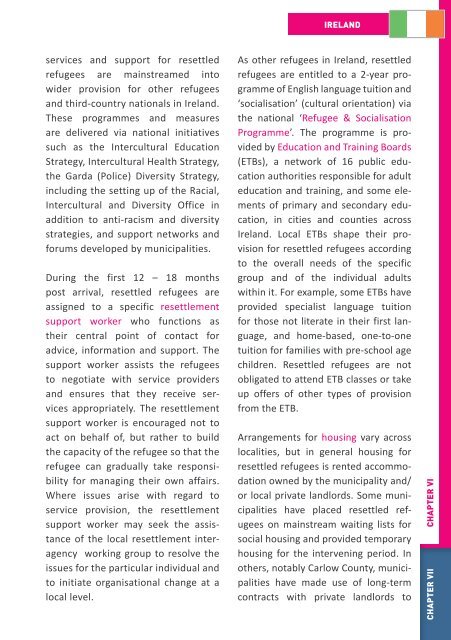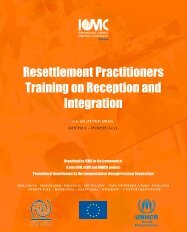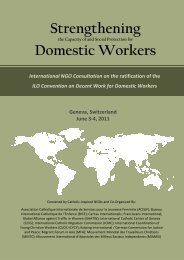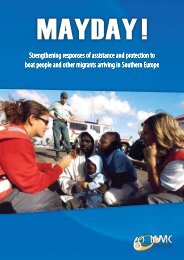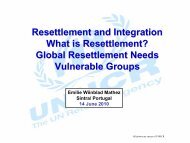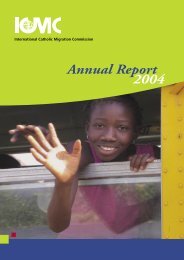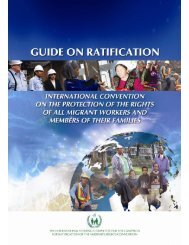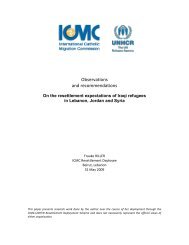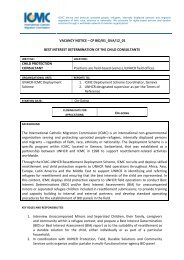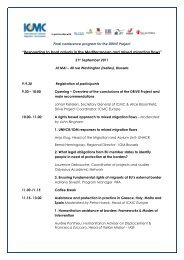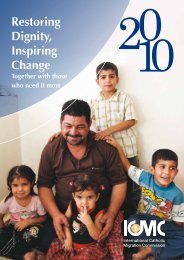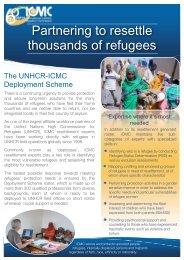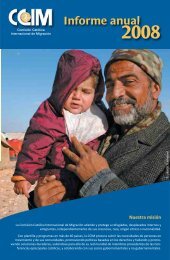ICMCEUROPE WelcometoEurope.pdf (5.89 MB)
ICMCEUROPE WelcometoEurope.pdf (5.89 MB)
ICMCEUROPE WelcometoEurope.pdf (5.89 MB)
Create successful ePaper yourself
Turn your PDF publications into a flip-book with our unique Google optimized e-Paper software.
Ireland<br />
services and support for resettled<br />
refugees are mainstreamed into<br />
wider provision for other refugees<br />
and third-country nationals in Ireland.<br />
These programmes and measures<br />
are delivered via national initiatives<br />
such as the Intercultural Education<br />
Strategy, Intercultural Health Strategy,<br />
the Garda (Police) Diversity Strategy,<br />
including the setting up of the Racial,<br />
Intercultural and Diversity Office in<br />
addition to anti-racism and diversity<br />
strategies, and support networks and<br />
forums developed by municipalities.<br />
During the first 12 – 18 months<br />
post arrival, resettled refugees are<br />
assigned to a specific resettlement<br />
support worker who functions as<br />
their central point of contact for<br />
advice, information and support. The<br />
support worker assists the refugees<br />
to negotiate with service providers<br />
and ensures that they receive services<br />
appropriately. The resettlement<br />
support worker is encouraged not to<br />
act on behalf of, but rather to build<br />
the capacity of the refugee so that the<br />
refugee can gradually take responsibility<br />
for managing their own affairs.<br />
Where issues arise with regard to<br />
service provision, the resettlement<br />
support worker may seek the assistance<br />
of the local resettlement interagency<br />
working group to resolve the<br />
issues for the particular individual and<br />
to initiate organisational change at a<br />
local level.<br />
As other refugees in Ireland, resettled<br />
refugees are entitled to a 2-year programme<br />
of English language tuition and<br />
‘socialisation’ (cultural orientation) via<br />
the national ‘Refugee & Socialisation<br />
Programme’. The programme is provided<br />
by Education and Training Boards<br />
(ETBs), a network of 16 public education<br />
authorities responsible for adult<br />
education and training, and some elements<br />
of primary and secondary education,<br />
in cities and counties across<br />
Ireland. Local ETBs shape their provision<br />
for resettled refugees according<br />
to the overall needs of the specific<br />
group and of the individual adults<br />
within it. For example, some ETBs have<br />
provided specialist language tuition<br />
for those not literate in their first language,<br />
and home-based, one-to-one<br />
tuition for families with pre-school age<br />
children. Resettled refugees are not<br />
obligated to attend ETB classes or take<br />
up offers of other types of provision<br />
from the ETB.<br />
Arrangements for housing vary across<br />
localities, but in general housing for<br />
resettled refugees is rented accommodation<br />
owned by the municipality and/<br />
or local private landlords. Some municipalities<br />
have placed resettled refugees<br />
on mainstream waiting lists for<br />
social housing and provided temporary<br />
housing for the intervening period. In<br />
others, notably Carlow County, municipalities<br />
have made use of long-term<br />
contracts with private landlords to<br />
CHAPTER VI<br />
CHAPTER VII


